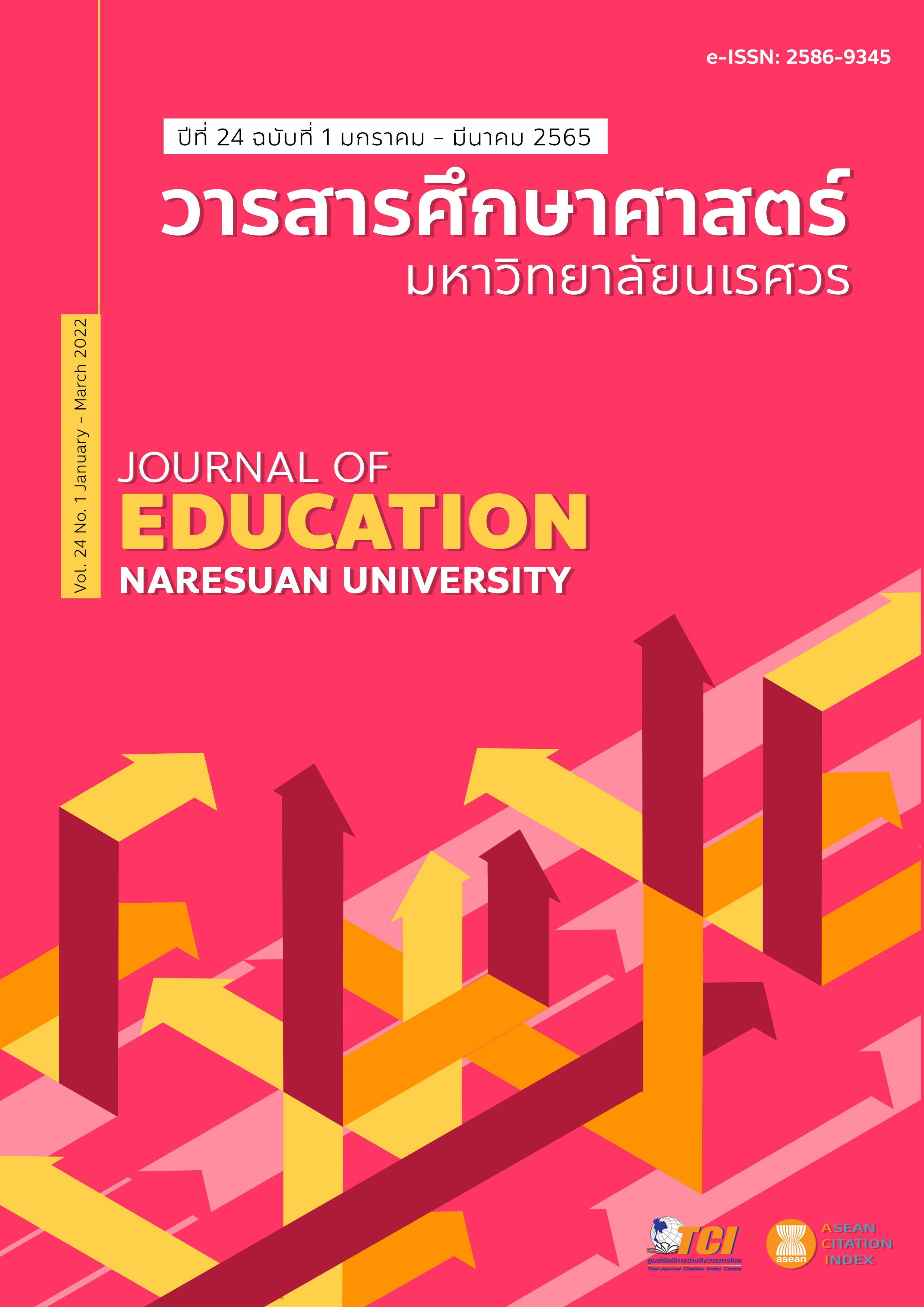THE DEVELOPMENT OF THE INSTRUCTION ARGUMENTATION USING FORENSIC SCIENCE ISSUE FOR PROMOTING THE SCIENTIFIC EXPLANTION ABILITY OF GRADE 10 STUDENTS ON HUMAN HOMEOSTASIS การพัฒนาการจัดการเรียนรู้ด้วยกลวิธีการโต้แย้งโดยใช้ประเด็นทางนิติวิทยาศาสตร์ เพื่อส่งเสริมความสามารถในการสร้างคำอธิบายทางวิทยาศาสตร์ของนักเรียนชั้นมัธยมศึกษาปีที่ 4 เรื่อง การรักษาดุลยภาพร่างกายมนุษย์
Main Article Content
Abstract
The purpose of this research was to develop an instruction using argumentation and forensic science issue for promoting the scientific explanation ability on human homeostasis of sixteen Grade-10 students. The research instruments were three lesson plans, reflection form, worksheets, and the scientific explanation ability test. The interpretive paradigm was used to analyze the data by using triangulation for checking the data reliability. The results showed that the instruction could be operated by; 1) using the ambiguous situation of the society to stimulate students to wonder, and created the scientific explanations, 2) giving students use their smartphones for searching information, and the teacher checking that information for giving suggestions and, 3) using scientific argument activities as a model of a scientific society to promote students’ scientific explanation ability. Finally, this research found that most of the students (61.14%) could show some claims and supporting evidence, but they lacked in reasoning, and the other students (23.33%) could present components of the scientific explanation completely.
Article Details

This work is licensed under a Creative Commons Attribution-NonCommercial-NoDerivatives 4.0 International License.
The owner of the article does not copy or violate any of its copyright. If any copyright infringement occurs or prosecution, in any case, the Editorial Board is not involved in all the rights to the owner of the article to be performed.
References
Anuworrachai, S. (2014). Learning management using constructing scientific explanations. School of Educational Studies, 7(2), 1-14. [in Thai]
Dahsa, J. (2017). Scientific inquiry in the next generation science standards. Humanities and Social Sciences, 8(2), 123-132. [in Thai]
Enderle, P. J., Grooms, J. A., & Sampson, V. (2012). Argument focused instruction and science proficiency in middle and high school classrooms, in Paper presented at the Annual International Conference of the National Association for Research in Science Teaching. Indianapolis, USA, NARST.
Kampiwtha, C., Bongkotphet, T., & Nangngam, P. (2018). The development of scientific reasoning ability through the generate an argument instructional model in digestive system topic for 10th grade students. Journal of Rangsit University: Teaching & Learning, 12(1), 56-71. [in Thai]
Kemmis, S., & Mctaggart, R. (1998). The action research planner. Geelong, Victoria: Deakin University Press.
Khemkong, S., Ketsing, J., & E-gobon, T. (2017). Good teaching practices in inquiry-based learning for developing grade 11th students’ scientific reasoning ability. The 13th Mahasarakham University Research Conference (pp. 77-87). Maha Sarakham: Mahasarakham University. [in Thai]
Ladachart, L., Chimphali, K., Aryowong, N., Ngaewkoodrua, N., Srakhao, S., Wangead, C., & Thammaprateep, J. (2015). Ninth grade students’ making scientific inferences and explanations. Silapakorn University Journal in the fields of Social Sciences, Humanities and Arts, 35(1), 171-206. [in Thai]
Lin, H. S., Hong, Z. R. & Huang, T. C. (2012). The role of emotional factors in building public scientific literacy and engagement with science. International Journal of Science Education, 34(1), 25–42.
McNeill, K. L., & Krajcik, J. (2006). Supporting students’ construction of scientific explanation through generic versus context-specific written scaffolds. Paper presented at the Annual Meeting of the American Educational Research Association, San Francisco, CA.
Meela, P., & Artdej, R. (2017). Model based inquiry and scientific explanation: promoting meaning-making in classroom. Journal of Education Naresuan University, 9(3), 1-15. [in Thai]
Novak, A. M., & Treagust, D. F. (2017). Adjusting claims as new evidence emerges: Do students incorporate new evidence into their scientific explanations? Journal Research in Science Teaching, 55(4), 526-549. https://doi.org/10.1002/tea.21429
OECD. (2015). PISA 2018 draft reading literacy framework, Proceedings of the 40th meeting of the PISA Governing Board, 26-28 October 2015; Munich, Germany.
Pipatchaiyapoom, P., Sawangmek, S., & Nangngam, P. (2016). Using argument-driven inquiry (ADI) based laboratory activities to enhance 11 graders’ understanding of the nature of science on reproduction and development of flowering plant topic (Master thesis). Phitsanulok: Naresuan University. [in Thai]
Saferstein, R. (2011). Forensic science: An introduction (2nd ed.). Eaglewood Cliffs, NJ: Prentice Hall.
Sapasuntikul, K. (2016). Effects of chemistry teaching strategy using the predict-observe-explain sequence on ability in scientific explanation making and rationality of tenth grade students (Master thesis). Bangkok: Chulalongkorn University. [in Thai]
Sebastiany, A. P., Pizzato, M. C., Diehl, I. F., & Salgado, T. D. M. (2013). Aprendiendo ainvestigar por medio de la ciencia forense e investigación criminal. Revista Eureka sobre Enseñanza y Divulgación de las Ciencias, 10(3), 480-490.
Sirithon, N., Jantarakantee, E., & Chainggan, S. (2017). Developing grade 10 students’ ability in making scientific explanation using argument-driven inquiry approach in the topic of force, mass, and law of motion. Proceedings of 55th Kasetsart University Annual Conference: Education, Economics and Business Administration, Humanities and Social Sciences (pp. 9-16). Bangkok: Kasetsart University. [in Thai]
Taruwun, T. (2017). The development of grade 11 students’ critical thinking by using problem–based learning and forensic science activity package (Master thesis). Khon Kaen: Khon Kaen University. [in Thai]
Thongarj, C. (2012). Moving forward to the twenty-first century: the winning post that Thai education has not yet reached. Journal of Education Studies, Chulalongkorn University, 40, 261-267. [in Thai]
Thongnoi, N., Pitiporntapin, S., Chumnanpue, P., & Phongpijit, P. (2017). Enhancing the ability in constructing scientific explanations of grade 10 students in ecosystem using socioscientific issues based-learning on scientific (Master thesis). Bangkok: Kasetsart University. [in Thai]
Tongprapai, K., Pitiporntapin, S., Shinnasin, K., & Jamjai, O. (2016). Development of grade 8 students’ argumentation skill in nutrients and life unit using socio-scientific issue (SSI) – based teaching. J. Res. Unit Sci. Technol. Environ. Learning, 7(1), 48-61. [in Thai]


